#harold peterson
Text


9 notes
·
View notes
Text
Some of my Queer as Folk hot takes:
The show absolutely did Emmett dirty with his love life. He deserved so much better. The show's romantic ending for him will infuriate me until the day I die. We get, what, 4 sentences from the guy Emmett winds up with?
The show making Hunter straight was stupid. Hunter is bisexual. Why else would he be so pursuant of Brian? Hunter even offered to pay Brian to sleep with him, which makes zero sense if Hunter was legitimately straight. I feel similarly about Lindsay. I think she's bisexual, not a lesbian.
Ted and Blake should not have ended up together. Their relationship has waaayyyyy too much baggage. It was built on trauma and continued to grow on unhealthy power dynamics. Granted, it is slightly better than Ted and Emmett winding up together (they were a billion times better as friends), but that's an incredibly low bar.
I love Justin, but Justin was kind of a prick during a lot of season 2. He enters into a relationship with Brian (an enormous step on Brian's part that Justin should have appreciated more). What does Justin do mere weeks later? Break their agreement with some random guy at a party. True, it must've been beyond frustrating for Justin that Brian refused to tell Justin that he loved him. Still, Justin's resentment that they weren't monogamous or romantic enough annoys me to no end. Justin agreed to Brian's suggested relationship, and Justin set the majority of the parameters for it himself. Justin was the only one who violated their boundaries as a couple, and he did so very quickly. Yes, him cheating and eventually leaving was kind of understandable because he was young, and Ethan fed him a lot of bullshit that got Justin's hopes up. But it remains terrible. Brian was often a shithead, but he deserved better.
THE HOTTEST TAKE: Brian and Justin not getting married was the right thing to do, and (here's the hot take part) they should not get back together. That is, unless Justin changes his mind about monogamy, he and Brian get a new place together where they can both be successful, and they take partial custody of Gus. I see the last 2 things potentially happening, but if Justin continues to be dead set on monogamy, his and Brian's relationship will always be doomed like Brian says.
I have more unpopular opinions if anyone wants to hear them. What are your QAF hot takes?
EDIT: I posted a part 2 as well.
#queer as folk 2000#queer as folk us#queer as folk#qaf#qaf 2000#qafamily#qaf us#britin#justin x brian#brian x justin#brian kinney#gale harold#justin taylor#randy harrison#emmett honeycutt#peter paige#ted schmidt#scott lowell#lindsay peterson
34 notes
·
View notes
Text
Roadside Attractions in Northwest Iowa!
My husband Keith and I headed to northwestern Iowa. We attended the 2024 Red Power Round Up, an International Harvester event held in Spencer, Iowa. We found lots of roadside attractions during our travels. Hosted by Iowa Chapter 5 of the IHCC group, the location was the Clay County Fairgrounds. This beautiful show was well planned. Then the rains came and ended the event early. Floods caused…

View On WordPress
#agricultural roots#Agricultural Treasures Guidebook#Albert City#Albert City Historical Museum#art#Art Deco Theater Pocahontas#barns#beauty#Busiest Little Town in Iowa#Claus Thams family#Clint Hansen#closed roads#Danish Windmill#devastation#dike#downtown Manning Iowa#Elkhorn Iowa#Farm Collector#finds#flooding#Fort Peterson#Freedom Rock#German barn#German Hausbarn#German heritage#Grotto of Redemption#Harold Schmidt#Historic Trinity Church#history#ice cream
3 notes
·
View notes
Text

44 notes
·
View notes
Text



I FORGOT TO POST THESE 💀💀
#the osix family#babqftim#babtqftim aus#babtqftim au#brian the dog#wendy the inkling#robert peterson#harold whitewood#wendy whitewood
20 notes
·
View notes
Text
It is indeed a Stormy Weather today, but listening to Oscar Peterson play makes me forget that it's awfully cold on this first day of June!
#Stormy Weather#Oscar Peterson#Oscar Peterson Plays the Harold Arlen Song Book#Oscar Emmanuel Peterson#Pianist#Canadian Pianist#Jazz Pianist#Canadian Jazz Pianist#Jazz#Jazz Music#Canadian Musician#Canadian Legend#Canadian Virtuoso#Favorite Montrealer#Favorite Quebecer#Favorite Mississaugan#Favorite Ontarian#Favorite Canadian#Canada Chronicles#Spotify
0 notes
Text
THE SCREEN: “Mae West Reveals Herself as a Circus Queen in “I’m No Angel” at the Paramount—Saturday's Millions”
I'M NO ANGEL, based on a story by Mae West and supported by Lowell Brentano; music and lyrics by Harvey Brooks, Gladys Du Bois and Ben Ellison; directed by Wesley Ruggles; a Paramount production. At the Times Square and Brooklyn Paramounts.
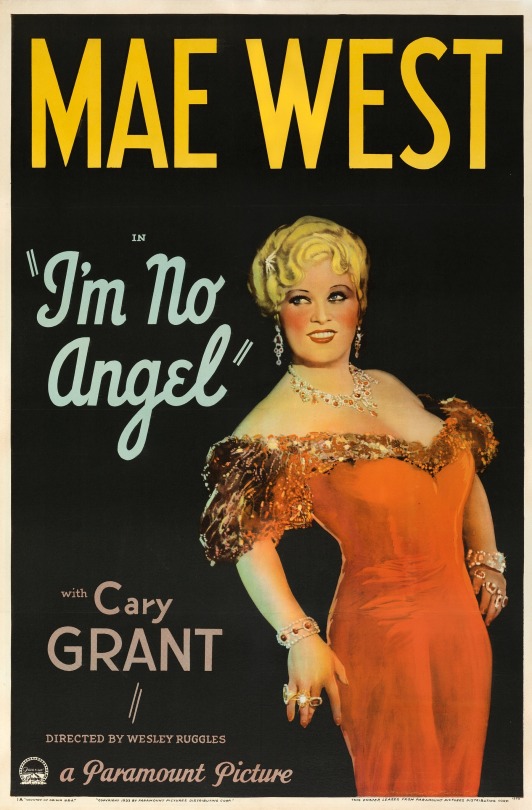
Tira .... Mae West
Jack Clayton .... Cary Grant
Bill Barton .... Edward Arnold
Slick .... Ralf Harolde
Alicia Hatton .... Gertrude Michael
Kirk .... Kent Taylor
Thelma .... Dorothy Peterson
Benny Pinkowitz .... Russell Hopton
Beulah .... Gertrud Michael
The Chump .... William Davidson
Rajah .... Nigel de Bruller
Bob .... Irving Pichel
Omnes.... George Bruggeman
Harry .... Nat Pendleton
Chauffeur .... Morrie Cohen
Judge .... Walter Walker
by MORDAUNT HALL.
Arrayed in a variety of costumes which set off her sinuous form, Mae West is appearing at the Paramount in her latest screen vehicle, "I'm No Angel," a title which, as might be surmised, fits the leading character. Here Miss West, who wrote the story herself from “suggestions contributed" by Lowell Brentano, is beheld as a circus beauty named Tira, who wins applause and admiration by risking her blond head in a lion's mouth twice daily.
It is a rapid-fire entertainment, with shameless but thoroughly contagious humor, and one in which Tira is always the mistress of the situation, whether it be in the cage with wild beasts, in her boudoir with admirers or in a court of law.
Tira is ever ready with & flip double entendre and' she permits no skeleton to be found behind her cupboard doors. She has an emphatic personality, which proves a magnet for even social lights with millions. She receives costly presents, Including diamond necklaces, but she is hardly a gold-digger. She refrains from posing, preferring to keep to her natural slangy speech in her journey through the story from a tent to a penthouse.
She admits that she has thrown discretion to the winds, and she sometimes finds herself in an awkward predicament, but through a wily lawyer she succeeds in proving that she is guiltless. The feeble parts of this picture are those in which a criminal known as Slick is introduced. The less one sees of him the better one feels, for the production is interesting only as long as it proceeds on its merry route.
The glimpses of Tira making her impressive entry to the circus arena and then proceeding to the big cage with the roaring lions are depicted shrewdly. Tira does not actually stick her whole head in the lion's mouth, but contents herself by putting her face between the beast's jaws, which is quite enough.
Even this is set forth with a certain degree of fun, and one feels that Tira probably has a pistol ready for an emergency and that other circus employees are ready to shoot in the event that the beast starts to close its mouth. But one is apt to wonder whether they could possibly be quick enough. Society among the spectators is thrilled, all except one snobbish girl, who is furious because her fiancé is very enthusiastic over the performer's courage-and her beauty.
Later there comes the time when Tira puts her fair head into a court of law as the plaintiff in a breach-of-promise case. She sues Jack Clayton, whom she really loves, for $1,000,000, and it is not Tira's artful counsel who wins the case, but the circus queen herself. She cross-examines the defendant's witnesses and turns their testimony in her own favor, the unusual proceeding being countenanced by a judge whose sympathy Tira wins with the utmost ease.
Miss West plays her part with the same brightness and naturalness that attended her second film role. There is no lack of spontaneity in her actions or in the utterance of her lines. She is a remarkable wit, after her fashion. Cary Grant is pleasing as Clayton and Walter Walker is excellent as the considerate old judge. Gregory Ratoff does well as Tara’s lawyer. Wesley Ruggles has directed the film with his usual intelligence.
#Paramount Pictures#I’m no Angel#Mae West#Cary Grant#Edward Arnold#Ralf Harolde#Gertrude Michael#Kent Taylor#Dorothy Peterson#Russell Hopton#Gertrud Michael#William Davidson#Nigel de Bruller#Irving Pichel#George Bruggeman#Nat Pendleton#Morrie Cohen#Walter Walker#Mordaunt Hall#The New York Times
1 note
·
View note
Text

My Work of Art with my Characters sleeping.
#sleeping#bikini bottomites#spongebob squarepants#male fish#fred spongebob#tom spongebob#harold#wobbles#scooter#reginald#nat peterson#frank#sandals
1 note
·
View note
Text


#sims 2#the sims 2#rose springs#peterson family#harold peterson#townie#at least im hoping shes a townie bc i forgor her name
2 notes
·
View notes
Photo
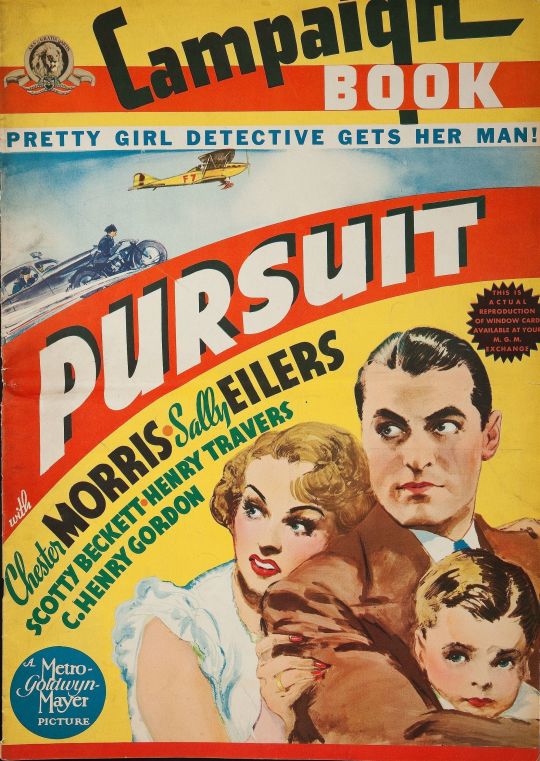



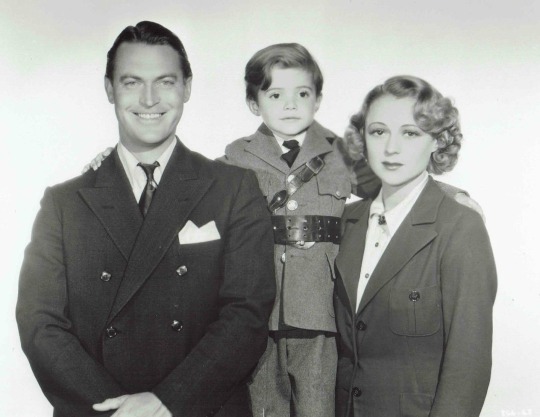

Pursuit (1935) Edwin L. Marin
February 10th 2023
#pursuit#1935#edwin l. marin#chester morris#sally eilers#scotty beckett#henry travers#erville alderson#c. henry gordon#dorothy peterson#harold huber#dewey robinson
1 note
·
View note
Note
Eddie Munson as a killer, seeing Steve in a trial
Rating: Mature
Fandom: Stranger Things
Characters: Eddie Munson, Steve Harrington,
Content: Character death, court room, rape mention
Summary: Steve is brought in as a witness to testify against Eddie who is on trial for a murder charge against Billy Hargrove.
—
Eddie knew Steve was being brought as a witness, and his gut ached ever since he found out. When he was brought into the courtroom in his orange jumpsuit and his arms handcuffed behind his back his biceps and wrists had been ticcing violently but the restraints forced them into place. He knew he’d have some bruises when he got back to his cell. His lawyer, Harold Peterson, had assured him that all of the evidence was circumstantial, and was confident that Eddie would walk. He didn’t care so much about that right now, as he watched Steve, handsome in his best suit, approached the stand. He didn’t even look at Eddie, he’d been crying with a dark red bite mark on his hand. His hair at least was immaculate, Eddie knew that meant he had spent too long fixing it up like he always did when he was anxious. Still, Eddie felt a twist of anger in his chest and tears begin to swell, dampening his thick dark brown eyebrows as he thought about how Steve wouldn’t even look at him.
“Do you swear to tell the truth, the whole truth, and nothing but the truth, so help you God?” The Clerk asked, which seemed to cause Steve to jolt. He cleared his throat and placed his hand on the bible, his voice hoarse and sore.
“Uh-huh. Yeah. I swear,” Steve stammered. Eddie didn’t dare look up, he knew this was coming. Steve was too good he was too moral. Too naive, still believed the cops would help in situations like this.
“Can you tell me where you were at 10:30pm on the night in question?” The prosecution asked. Eddie vaguely recognised him from his billboards around Hawkins - Jeremy Oldman. He was expensive, Billy’s dad must be really sore, he thought.
“I was at work, at Family Video. Store closes at 11 on Fridays.” Steve spoke as if he’d rehearsed his responses, they reminded Eddie of when he had to give evidence against his dad. Stay calm, say what’s relevant.
“And your colleague Miss Buckley can verify that?” Prosecutor Oldman asked.
“Yes, sir.”
“And when did you find out about William Hargrove being hospitalised?”
“Erm, the next morning from my bro- from Deputy Harrington, sir.” Steve threw a look towards the audience, Eddie turned around and sure enough Gator Harrington was there in his uniform. Eddie had to admit after being interviewed by the guy he did lose a lot of respect for him.
“And do you remember seeing the accused the night of the murder?” When Oldman asked Steve winced, Eddie felt some relief at that. Maybe they weren’t over.
“I- well, I saw him that afternoon. He spent the night at mine and then I- dunno.” Steve paused, he threw a look at Eddie, a disappointed frown. “I drove him to school. I would’ve picked him up but he had the Hellfire club. Or so I thought.”
“Can you elaborate on that? So you thought?”
“Erm. Dustin came into the store-”
“That’s Dustin Henderson?” Oldman interrupted forcefully.
“Yeah he’s a buddy of mine and Eds- Edward Munson’s, sir,” Steve corrected. He was using his masked voice, the same he used when on the phone to his dad.
“So he came into Family Video?”
“Yeah and he said Eddie had cancelled this week’s meet which is weird. He never does that.”
“And what do you think he was doing-”
“Objection, your honour,” Attorney Peterson said suddenly from Eddie’s right making him jump. “Conjecture.”
“Approved,” Judge Wallace confirmed. Eddie looked at her for the first time, before he’d been far too frightened and felt as if she suddenly appeared before him. She was in her fifties, her tight curls pinned back and her glasses were on the end of her nose.
“Let me reword that. Did this worry you?” Oldman said, a tense irritation to his voice like he wasn’t used to being challenged. That felt strange to Eddie given his profession.
“Yeah. I thought he was sick or something.” Steve sounded hurt when he said that, and Eddie’s neck snapped up. His thick black eyebrows were furrowed as he stared at Steve who wouldn’t meet his eyes. Is that what this is about? He was upset that Eddie didn’t tell him?
“Tell me, Mister Harrington, how did Mister Munson feel about William Hargrove-”
“Objection. Hearsay. We’re not gossiping here are we?” Peterson said with a mocking laughter on his voice. Eddie was lucky that he got him as a public defender he had to admit, he had slicked back blond hair and twinkling brown eyes that made him look a mixture of professional and sleazy.
“I’ll allow it but tread carefully, councillor,” Judge Wallace repeated. She reminded Eddie of his old Math teacher.
“Thank you, your honour. So how do you think Mister Munson feels about William Hargrove?”
“He- he doesn’t like him but- but hardly anyone does. He has good reason-”
“Do you think he’d wish harm on him?” Oldman interrupted a little forcefully.
“I- well-” Steve hesitated. For the first time he looked at Eddie properly, his cheeks burned red and his eyes began to water.
“Answer the question, please, Mister Harrington.”
“The erm, I’d find it difficult to picture him acting on anything.”
“But you think he’d wish him harm?” Oldham insisted again, Eddie almost wanted to tell him off.
“I- erm- I mean, I guess- I mean thinking and fantasies aren’t illegal, right?” Steve joked awkwardly.
“But he did wish him harm? Yes or no, please.”
“I- erm- yes.” Steve had an apologetic look on his face as he turned to Eddie, who in turn gave a small smile and relaxed slightly, he was still terrified of jail but at least Steve didn’t completely despise him.
“Can you tell the court about how you found out about William Hargrove?” Oldman asked, even thought it was clear from the jury and the audience that they were more curious about Steve’s conflict, Eddie thought.
“I- erm- well, Gator- the deputy was round for breakfast and he said he’d had a late night because of it. Everyone was really freaked out.”
“And did you talk to Mister Munson about it?”
“I- erm- yeah- I text him. Why-”
“And what did he say?”
“I- erm-” Steve stopped. “I don’t-”
“What did he says Mister Harrington?”
“That it was only Billy. And he deserved it,” Steve mumbled reluctantly.
“Thank you, Mister Harrington. No further questions.”
“Anything to add, councillor?” Judge Wallace directed at Peterson. He stood up immediately, his suit looked fancy, you could barely tell it was thrifted, Eddie thought.
“I’d like to circle back to something the prosecution said,” Peterson began, pacing back and forth. His demeanour was far friendlier than Oldman’s. “Mister Harrington, can you tell me again, do you think my client is capable of murder?”
“I- erm- well, I didn’t think so.” Steve’s tone was reluctant, Eddie felt pang of irritation at how Steve was talking to his lawyer, as irrational as it was.
“I know, it’s tricky when he has been accused.” Steve looked taken aback by Peterson’s friendly tone and actually managed to relax. Eddie was relieved, his fingers were entwined in front of him ticcing back and forth. “But do you truly think that my client did it.”
“I mean, he’s a suspect so-”
“I’m going to have to insist on yes or no, I’m afraid,” Peterson interrupted.
“I- No. I don’t think he did it, necessarily,” Steve eventually admitted. Eddie’s back straightened and he held his breath as his brown eyes lit up. He stared at Steve in disbelief, he threw a look behind him. Gator was not happy.
“Necessarily?”
“I dunno, Billy hurt people in the Hellfire club really bad. And Eddie likes protecting people.” There was an odd look on Steve’s face, like there was something he’d been told to keep quiet about even thought he thought it was important.
“So if my client suspected one of his friends of a murder, what would he do?” Peterson asked calmly.
“He’d take the fall,” Steve answered immediately.
“And, Mister Harrington, you do know what school has been like for Mister Munson don’t you?” Peterson gestured at Eddie as he spoke, almost like he was using Steve’s connection to Eddie to benefit them.
“Yeah, he got bullied pretty bad,” Steve answered quickly. The opposite of how reluctant he’d been with Oldman, Eddie glanced at the jury… They seemed receptive.
“And did he ever resort to violence then?”
“No.” Steve was more certain of that than anything else he’d said.
“Tell me, is he a very physical guy?”
“Oh, absolutely not.”
“Is hitting William Hargrove so hard with a baseball bat that he was comatose and then hospitalised - is that extremely out of character for him?”
“Yeah, absolutely.”
“And even if he did, hypothetically, do it, which obviously my client has pled not guilty.” Peterson spoke as if he was protective of his client, and Eddie found himself feeling like a child with his parent. “There’s no way he could have known that William Hargrove would die of his injuries? He wouldn’t know how to hit him to hurt him on purpose.”
“Yeah. Yeah, exactly. If Eddie did do it. It was an accident. He’d have just meant to scare him. He’s never even used a bat outside of gym class,” Steve joked, or attempted to. His voice sounded more desperate.
“But even then, that isn’t the Eddie you know, is it?”
“No. No, sir.” Steve shook his head as he spoke for emphasis.
“Do you know about everything Mister Hargrove did to various members of the Hellfire Club, Mister Harrington?” Peterson asked, causing Eddie to tense. He told him not to bring any of that up. He looked over at Oldman who looked worried, he knew something, Eddie thought.
“I- erm- I know he was a real dick to them,” Steve said, more as if he was trying to think rather than he was reluctant to.
“Do you think any of them might have a motive to hurt William Hargrove?”
“Yeah, absolutely.”
“Any names spring to-”
“Your honour. Objection,” Oldman said as he stood, it was obvious to everyone he was starting to panic. “There’s no evidence for any of this, it is clearly hearsay and conjecture. The police already interviewed everyone in this club.”
“He’s right councillor,” Judge Wallace reluctantly admitted. “Can you justify this line of questioning?”
“Yes. I’m pointing out the many holes in the prosecutions story and showing there is plenty of room for reasonable doubt. As well as raising other potential suspects,” Peterson said calmly, a small smirk on his lips.
“I’ll allow it, but tread carefully, councillor.”
“Thank you, your honour.” He bowed and then turned back to Steve. “Do you know what William Hargrove did to Mister Gareth Walton?”
“Objection! Mister Hargrove is not on trial here,” Oldman spluttered, getting to his feet.
“Yes, councillor where are you going with this.”
“I received information that I think the prosecution and jury should know, and if someone else knew they should have disclosed,” Peterson said, his cheerful expression had hardened. Oldman was silent. Steve looked at Eddie and could see he was visibly panicking, his chest was starting to heave, he told the lawyer not to use this. Peterson promised, he feels himself rocking back and forth, wanting to say something but his jaw is doing the anxious tic where it clicks side to side and he can’t make it stop. Steve wants to run over and hold him, but all he can do is stay put.
“And what is that councillor?” Judge Wallace asked.
“One of Edward Munson’s close friends, Gareth Walton was viciously beaten, raped, and left for dead by William Hargrove. Who wasn’t questioned by the police, by the way.”
“Your Honour-”
“I want to know why wasn’t Gareth Walton given the same treatment as my client?” Peterson asked as he turned to Oldman.
“Your Honour this is-”
“No further questions,” Peterson said. They dismissed Steve as he got to his feet, he looked at Eddie with pleading eyes. He returned a small smile, he felt terrible guilt that what happened to Gareth was dragged over the court room… But the feeling of the steel in his hand from when he smashed the bat into Billy’s skull? That had redeemed him, he hoped.
33 notes
·
View notes
Text
i’ve had this long list of td surname headcanons (and i guess some of them are nationality headcanons) for a while and haven’t done much about them, so…
here are each generation’s surnames! (except for rr since i’m not too confident about them)
gen 1:
harold norbert cheever doris mcgrady V
cody emmett jameson anderson
lindsay tyson
noah könig (german)
eva barta (czech)
izzy clark
owen fraser
trent evans-grant
gwen kennedy
heather ryeo
bridgette summers
leshawna simelane (south african iirc)
beth spring
devon ‘dj’ joseph
alejandro burromuerto (spanish)
sierra kauffman (german)
tyler wilson
ezekiel miller
courtney cortez (spanish, or from somewhere where they speak spanish primarily)
duncan butcher
katie wan (malaysian)
sadie peterson (originally was gonna give her a romanian surname but here is peterson)
justin kāne (hawaiian)
geoff jasper
gen 2:
josef ‘jo’ kaczmarek (Polish)
brick macarthur
anne-maria chahuán (chilean)
michele ‘mike’ russo
cameron corduroy wilkins
rudolph ‘lightning’ jackson
staci sterling
zoey gates
dawn oakwood
scott brackin (irish)
dakota milton
sam stevens
beverly ‘b’ jones
gen 3:
ella ito-courtemanche (japanese and french)
scarlett montgomery
max mayhem (yes. i’m actually giving him that as his surname. get sillyed)
jasmine reynolds
shawn tremblay
dave korrapati (indian, more commonly in telugu-speaking areas)
sky sanderson (i was a bit uhm. stuck with this one. i looked up ‘cree surnames’ but found only three. i went for this one but i’m still uncertain.)
amy martin
samantha ‘samey’ martin
topher mccann
rodney rogers
sugar silo
beardo mbomio (equatoguinean)
leonard howe
gen 4:
nichelle ladonna (italian)
bowie davis
emma fletcher
julia hartwell-hughes
priya khan (indian)
millie carter
chase boonmee (thai. it means ‘reliable, generous, loyal’. ironic)
raj ghosh (indian)
wayne watterson
mary-kate ‘mk’ yí (chinese. in honour of fai yí, my beloved)
damien reid
hezekias ‘zee’ guzman (argentinian (it means ‘good man’ which is what he is!!!))
rhinffrew ‘ripper’ bowen (welsh (WELSH RIPPER REAL))
caleb garcia (hispanic)
axel sanchez-guðmundsdóttir (hispanic(?) and icelandic. yes, apparently ‘axel’ is an icelandic name!)
#ok i kept two of the comeback surnames. i actually really like them. bite me.#(i hope i used that phrase correctly)#btw geoff’s surname is based off this really nice person from my school i met during our oliver! production!#he doesn’t go to my school anymore because he graduated. i hope he’s doing well#i’m realising now that priya and raj’s surnames are both surnames of my classmates.#like i genuinely didn’t name them after these people. this is a total coincidence#IF there is any mistakes in this please correct me. a lot of these are taken from websites#(i made up the first gen surnames first…. i actually looked up ‘canadian surnames’ LMAO)#oh yeah i named noah after someone i know too (my german exchange partner). also he’s like. a king#I LOVE NAMING THINGS#IT’S SO FUN#naming characters is one of my favourite parts of creating characters#(although i accidentally named two octuplets characters after like. people idk.)#((and one character was nearly named after a WWI war general!))#ANYWAYS#total drama#td#I AM NOT TAGGING ALL THOSE CHARACTERS
47 notes
·
View notes
Text
H.P(Head Pixie) Human name
9 notes
·
View notes
Text
6 Black Gods of Ancient America You Should Know
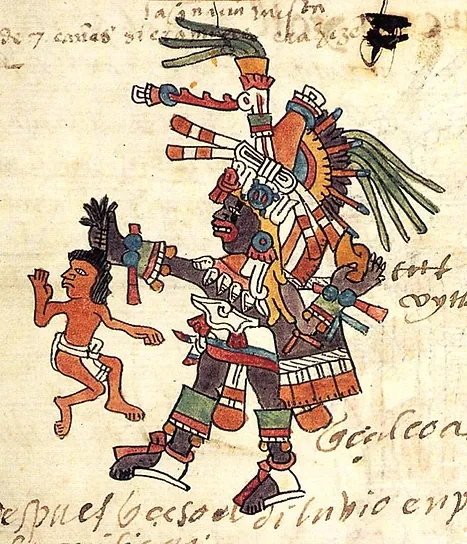
"Several Indian nations, such as the Mayans, Aztecs, and Incas, worshipped black gods along with their other deities, and the Mayan religion particularly exemplifies the high esteem in which the negroes were held." --Harold G. Lawrence, The crisis, 1962
Why were all indigenous religions and spiritual systems deemed as "pagan" or "evil"and were replaced during colonizations? It would be hard to subjugate a people who were previously worshipped without replacing old traditions with new ones. Lets examine some of the anicent gods found right here in America before colonization. "Many Scholars have noted, the Black gods of the Americas are typically gods of
medicine and healing, trade, or music and dance. According to these scholars, these associations are based on the traditions introduced by actual Black people."
1. EKCHUAH, THE BLACK STAR

EKCHUAH, was the sixth most commonly depicted deity in the Mayan codices, protrayed at least forty times. He is painted Black with thick lips, His name means "Black Star" (ek means "star" and chuah means "black" in Yucatan Maya). Flod Hayes III reports that among many of the Indians of Guatemala, "the black Christ is referred to in private as Ekchuah," who Harold Lawerence describes as "black and woolly-haired" and "unmistakenly Negro." In Africa and the Discovery of America, Leo Weiner connects the Mayan god Ekchuah to the African Nama societies of the Malinke and Bambara people of West Africa. Ekchuah may have been based on an older Black god, known to us only as God M.
2. GOD M
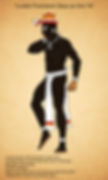
God M is represented throughtout the ancient codices as a Black god, specifically an "old man" with a toothless jaw or one tooth. He appears to be a trader, often shown carrying goods on his head. In volume III of Africa and the Discovery of America Leo Weiner says West Africans like Malinkes and Bambaras made voyages to the Americas long before Columbus. He identifies many of the Mayan and Aztec gods as being derived from the reverance paid to these Black visitors.
3. THE MAYAN PRIESTS

Frederick Peterson, In his 1959 work Ancient Mexico, remarked: " We can trace the slow progress of man in Mexico without noting any definite Old World influence during this period (1000-650BC), except possibly a strong Negroid substratum connected with the Magicians. "
The Magician may have been West Africans who traveled to Mexico or a class of Black people who could ONLY marry among themselves, effectively presereving the African phenotype over untold generations. This reverence for Black people may have something to do with why many Native Americans, inculding the Mayas, respected enslaved Africans and revered Black gods that represented the principles of healing and good fortune.
4. TEZCATLIPOCA, THE AZTEC GOD
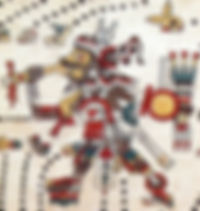
Tezcatlipoca was one of the most important gods in ancient Mesoamerica. He began as important diety for the Toltecs and later became the supreme god of the Aztecs. He was seen as a Creator, the god of sustenance, a patron god of warriors, and the bringer of both good and evil. "Black Tezcatlipoca" is the most feared and highly revered. The earliest representations of him represent him as black. His priest would cover themelves in black soot or charcoal to associate themselves with the Black god. They would also paint the newly appointed king black to associate him with Tezcatlipoca.
5. KOKOPELLI, THE GREAT HUNTER
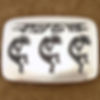
Kokopelli is a well-known fertility god and hunter among the Hopi and Zuni people of the America southwest. As the spirit of fertility, he is seen as responsible for introducing corn (agriculture) to various peoples across the Americas. Kokopelli was first found in Anasazi rock cravings, but he also appears in Missippian artifacts. Throughout South America, he is known as Ekoko. He is believed to descend from the Mayan Ekchuah. Kokopelli is identified with the southwestern Tewa people's god Nepokwa'i, a great hunter who is described as "a big black man."
6. BLACK GOD OF THE NAVAHO

Among the Navaho, there is a deity known as Black God. He is not widely-celebrated, but is very important because his knowledge of medicine saved the rest of the Navaho gods from certain death. Black God is the Navajo god of fire. Perhaps because of this, he is also considered the creator of the stars. He is often depicted as black "like space" and wearing a crescent moon on his forehead, with the stars of Pleiades dotted on his temple. But Black God was most likely a medicine man before he came to be known as the god of fire.
Article Source::
Black God: An Introduction To The World's Religions And Their Black Gods by Dr. Supreme Understanding
21 notes
·
View notes
Text
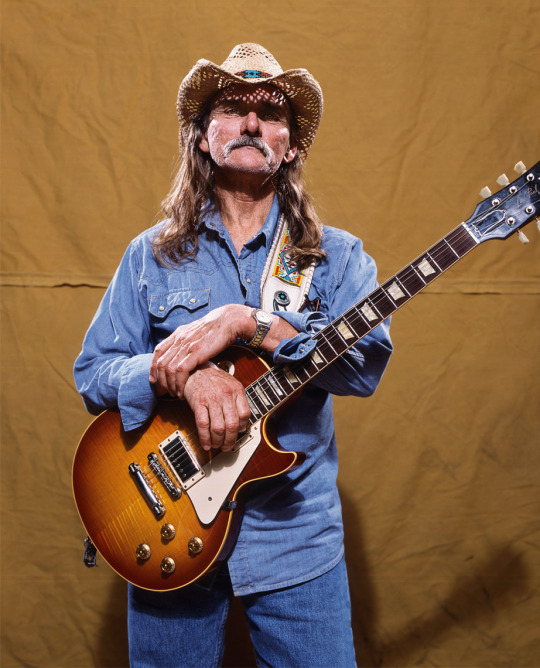
Dickey Betts
Guitarist, singer and founding member of the Allman Brothers Band best known for writing their 1973 hit Ramblin’ Man
Dickey Betts, who has died aged 80, was a founder member of the Allman Brothers Band, one of the most influential US “southern rock” groups of the 1970s. The hard-living outfit blazed out of Jacksonville, Florida, in 1969 with a mix of rock, blues, country and jazz that defined the genre, also influencing artists such as Lynyrd Skynyrd, ZZ Top, the Black Crowes and Kid Rock. They scored several platinum and gold albums and were inducted into the Rock & Roll Hall of Fame.
Although the six-piece band was ostensibly led by the blond- haired Allman brothers, Duane and Gregg (guitar and keyboards/vocals respectively), as joint lead guitarist, singer and main songwriter Betts played a crucial role. A larger than life character with his cowboy hats, long moustache and gunslinger good looks, Betts wrote many of the band’s best loved songs, including Jessica, Blue Sky and the 1973 US No 2 smash Ramblin’ Man, inspired by life on the road.
The signature duelling of Betts’s and Duane Allman’s lead guitars rewrote the rule book of how twin guitarists play together - previously one had played lead and the other rhythm. The band’s huge fanbase included President Jimmy Carter, and in 2020 Betts even received the rare accolade of a mention in a Bob Dylan song, when Murder Most Foul contained the line “Play Oscar Peterson, play Stan Getz/Play Blue Sky, play Dickey Betts.”
He was also the inspiration for the rock star character played by Billy Crudup in the former rock journalist Cameron Crowe’s film Almost Famous (2000), the director having been drawn to Betts’s aura of “possible danger and playful recklessness behind his eyes”.
Betts was born in West Palm Beach, Florida, one of the three children of Harold, a carpenter, and his wife, Sarah (nee Brinson), who wrote poetry and played the cornet in a Salvation Army band. Although his father was also a keen fiddler, Dickey’s first instrument was the ukelele, which he started playing aged five, later graduating to the mandolin and the banjo.
He was at West Gate elementary school when he wrote his first song, Seven Years With Pamela, about his sister. He then attended various West Palm Beach schools until seventh grade, dropping out of high school when he was 16, by which time his pursuits included carpentry, hunting and listening to the Grand Ole Opry on the family radio.
Hearing Chuck Berry’s Maybellene in his mid-teens prompted another switch of instrument, as he “started realising that girls like guitars”. He dropped out of high school aged 16 to tour the US with a travelling circus in his first band, the Swinging Saints, but was playing in Second Coming with the bassist Berry Oakley when Duane Allman invited both men to join his new group.
The lineup was completed by the drummer Butch Trucks and – unusually in white-dominated 60s southern rock - a black second drummer, James Lee Johnson, who had previously played with Otis Redding and Percy Sledge.
Although sales of their first two albums were sluggish, Duane Allman’s appearance on Eric Clapton’s 1970 album Layla and Other Assorted Love Songs – which included the classic hit Layla – boosted the heavy-touring Allman Brothers Band’s rising profile. Their 1971 live album At Fillmore East sold 1m copies.
After Duane Allman and Oakley were killed in motorcycle accidents in 1971 and 1972 respectively, Betts led a rejigged lineup. The 1973 album Brothers and Sisters – featuring Ramblin’ Man and the instrumental Jessica, later the theme to the television motoring show Top Gear – topped the US charts for five weeks, while 1975’s Win, Lose Or Draw went into the Top five. By then the band were succumbing to a familiar music industry cocktail of success, drugs, alcohol and feuding.
Betts and Gregg Allman both made solo albums, before Betts felt betrayed when the latter testified against the band’s road manager in a 1976 drugs case and refused to work with him again. Nevertheless, they regrouped in 1978, splitting again in 1982.
A second comeback in 1989 proved more enduring, although in 2000 Betts was fired over his drinking. That third spell in the band had been dogged by alcohol and drug abuse, lawsuits and arrests, and in 1996 he was charged with aggravated domestic assault after pointing a handgun at his fifth wife, Donna (nee Stearns), whom he had married in 1989. The charges were dropped after Betts agreed to enter rehab.
In his later years he returned with his own Dickey Betts Band and played in the band Great Southern with his son Duane. True to his ramblin’ man credentials, he remained on the road to the last, even after brain surgery following a 2018 fall at home, and he released live albums well into his 70s.
He is survived by Donna and his children, Kimberly, Christy, Jessica and Duane.
🔔 Forrest Richard Betts, musician, singer and songwriter, born 12 December 1943; died 18 April 2024
Daily inspiration. Discover more photos at Just for Books…?
16 notes
·
View notes
Text
little nuggets from the Duncan v. Bonta, No. 19-55376 (9th Cir. 2021) ruling. California's magazine ban.
Judge Roger T. Benitez (St. Benitez) is dropping truth bombs all over Rob Bonta, Attorney General of the State of California.
“Rather than re-tell the long history of large-capacity magazines in this country, we offer some highlights:
• The first known firearm capable of firing more than ten rounds without reloading was a 16-shooter invented in 1580.
• The earliest record of a repeating firearm in America noted that it fired more than ten rounds: In 1722, Samuel Niles wrote of Indians being entertained by a firearm that “though loaded but once, . . . was discharged eleven times following, with bullets, in the space of two minutes.” Harold L. Peterson, Arms and Armor in Colonial America 1526–1783, 215 (2000). DUNCAN V. BONTA 133 • At the Founding, the state-of the-art firearm was the Girandoni air rifle with a 22-shot magazine capacity. • In 1777, Joseph Belton demonstrated a 16-shot repeating rifle before the Continental Congress, seeking approval for its manufacture. Robert Held, The Belton Systems, 1758 & 1784–86: America’s First Repeating Firearms 37 (1986).
• By the 1830s, “Pepperbox” pistols had been introduced to the American public and became commercially successful. Depending on the model, the Pepperbox could fire 5, 6, 12, 18, or 24 rounds without reloading. • It took several years for Samuel Colt’s revolvers (also invented in the 1830s) to surpass the Pepperbox pistol in the marketplace.
• From the 1830s to the 1850s, several more rifles were invented with large ammunition capacities, ranging from 12- to 38- shot magazines.
• By 1855, Daniel Wesson (of Smith and Wesson fame) and Oliver Winchester collaborated to introduce the lever action rifle, which contained a 30-round magazine that could be emptied in less than one minute. A later iteration of this rifle, the 16-round Henry lever action rifle, became commercially successful, selling about 14,000 from 1860 to 1866.
• By 1866, the first Winchester rifle, the Model 1866, could hold 17 rounds in the magazine and one in the chamber, all of which could be fired in nine seconds. All told, Winchester made over 170,000 copies of the from 1866 to 1898. See Norm Flayderman, Flayderman’s 134 DUNCAN V. BONTA Guide to Antique Firearms and Their Values 268 (6th ed. 1994).
• A few years later, Winchester produced the M1873, capable of holding 10 to 11 rounds, of which over 720,000 copies were made from 1873 to 1919.
From this history, the clear picture emerges that firearms with large-capacity capabilities were widely possessed by law-abiding citizens by the time of the Second Amendment’s incorporation. In that way, today’s large-capacity magazines are “modern-day equivalents” of these historical arms, and are entitled to the Second Amendment’s protection.” Pages 132-134
“Characterizing my car ban analogies as “inapt,” the majority says that California’s magazine ban is more akin to “speed limits.” But in attempting to trade my analogies for a more favorable one, the majority misses the obvious point: that in every context except our distorted Second Amendment jurisprudence, everyone agrees that when you evaluate whether a response to avoid some harm is “rational”—much less a “reasonable fit”—you takes into account both the gravity of the possible harm and the risk of it occurring. The majority here completely ignores the latter. Perhaps if I use the majority’s own analogy it might click: If California chose to impose a state-wide 10 mph speed limit to prevent the very real harm of over 3,700 motor-vehicle deaths each year experienced from driving over 10 mph, no one would think such a response is rational—precisely because, even though the many deaths from such crashes are terrible, they are a comparatively rare occurrence (although much more common than deaths caused by mass shootings).” Page 152
“The majority also relies on the argument that limiting magazine capacity provides “precious down-time” during reloading, giving “victims and law enforcement officers” time to “fight back.” But here again, that same “down-time” applies equally to a mother seeking to protect herself and her children from a gang of criminals breaking into her home, or a law-abiding citizen caught alone by one of the lawless criminal mobs that recently have been terrorizing cities in our circuit. The majority focuses only on ways higher capacity magazines might cause more harm in the very rare mass shooting, while dismissing the life-threatening impact of being forced to reload in a self-defense situation as a mere “inconvenience,” and characterizing as mere “speculat[ion] . . . situations in which a person might want to use a largecapacity magazine for self-defense.”
Ultimately, it is not altogether surprising that federal judges, who have armed security protecting their workplace, home security systems supplied at taxpayer expense, and the ability to call an armed marshal to their upper-middleclass home whenever they feel the whiff of a threat, would have trouble relating to why the average person might want a magazine with over ten rounds to defend herself. But this simply reinforces why those same judges shouldn’t be expected to fairly balance any Second Amendment test asking whether ordinary law-abiding citizens really need some firearm product or usage.” Pages 164 and 165
36 notes
·
View notes